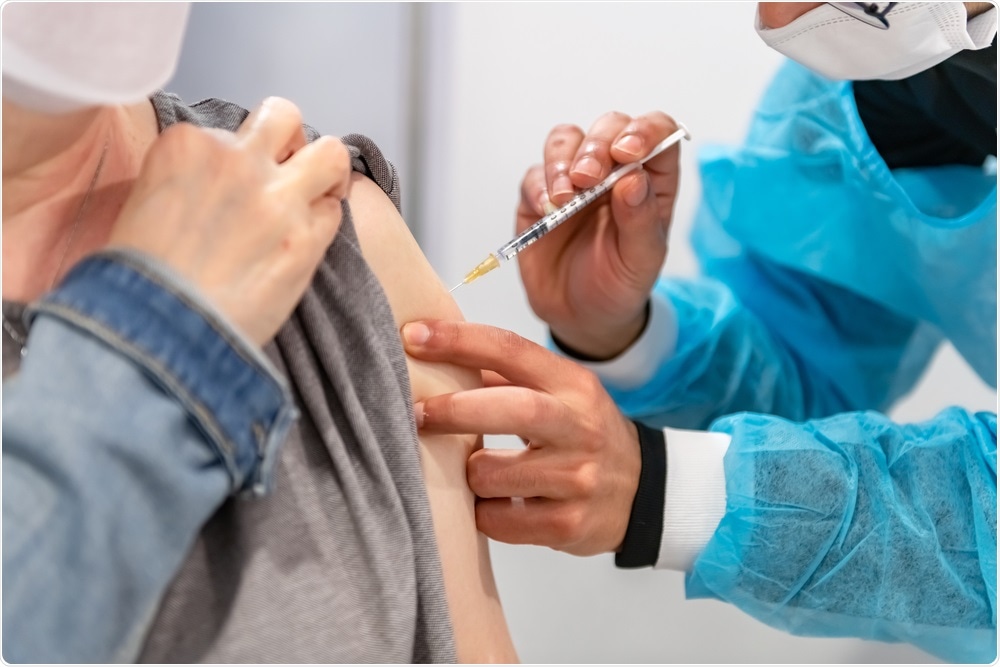Immunity against the severe acute respiratory syndrome coronavirus 2 (SARS-CoV-2) is developed through natural infection or vaccination. Coronavirus disease 2019 (COVID-19) vaccination protects against infection, reinfection, and reduces severe clinical consequences.
Data from previous studies show that seropositive adults recovering from COVID-19 have 90% protection from SARS-CoV-2 reinfection after 150 days, while vaccination has been reported to provide 50- 95% protection at various times points. Since the spike-specific CD4+ cellular immune responses and the memory B-cell humoral response to SARS-CoV-2 significantly reduce over time, the risk of diminishing SARS-CoV-2 immune protection increases in vaccinated populations and convalescent COVID-19 patients.

Study: Elapsed time since BNT162b2 vaccine and risk of SARS-CoV-2 infection: test negative design study. Image Credit: Yuri Dondish / Shutterstock.com
A large-scale vaccination campaign was initiated in Israel on December 20, 2020. Subsequently, the country achieved early control over the spread of SARS-CoV-2 due to the centralized health services and use of only one vaccine (Pfizer-BioNTech vaccine). However, a large number of SARS-CoV-2 reinfection cases were noted in Israel because of decreasing levels of anti-SARS-CoV-2 antibodies in vaccinated people.
About the study
A recent retrospective study published in the British Medical Journal describes the association between time elapsed since administration of the second dose of the Pfizer-BioNTech BNT162b2 vaccine and the risk of COVID-19. The authors conducted a test-negative design study in adult members of Leumit Health Services who had been tested for SARS-CoV-2 between May 15, 2021, and September 17, 2021, after receiving two doses of the vaccine. The reverse transcription-polymerase chain reaction (RT-PCR) test was performed at least three weeks after their second vaccine dose.
The test-negative design was similar to a nested case-control design, in which the individuals tested for SARS-CoV-2 served as the nesting cohort. This cohort was divided into three age groups of those older than 60, between the ages of 40-59, or between the ages of 18-39 to reflect the vaccine rollout stages.
The duration between the second vaccine dose and the RT-PCR test was divided into 30-day intervals, after the initial 90 days. These time points included 90-119 days, 120-149 days, 150-179 days, and more than 180 days. Additionally, the study population was categorized into three demographic groups including the general population, ultraorthodox Jews, and individuals of Arab ancestry.
Key findings
In this retrospective study, the authors found a significantly higher risk of SARS-CoV-2 infection with time elapsed since the second vaccine dose after the initial 90 days. Out of 83,057 adults who were tested using RT-PCR for SARS-CoV-2 during the study period, 9.6% were found to be SARS-CoV-2-positive.
The increase in risk was observed in the pre-matched cohort and was established in a cohort matched for a week of testing, age categories, and demographic group, and further adjusted for sex, age, socioeconomic status, and chronic comorbid conditions.
The United States Food and Drug Administration (FDA) authorized emergency use of the BNT162b2 vaccine based on the safety and efficacy data for a median time of more than two but less than three months, which led to the beginning of mass vaccination in this country. The findings of the study confirmed that while the BNT162b2 vaccine provided protection in the initial weeks after vaccination, the protection wanes with time in some individuals.
The current study also depicted that protection offered by two doses of the Pfizer-BioNTech BNT162b2 vaccine, 21 days apart, decreased after several months, and that the immune response to the vaccines was influenced by changes in the immune system related to age.
Strength and limitations of the study
Strengths of the current study include the use of a large cohort of individuals who were vaccinated twice with the same vaccine, with detailed demographic and clinical information. The study design quantified the increased risk of COVID-19 with increasing time from the second injection. The study reflected the protection given by the vaccine against the SARS-CoV-2 Delta variant, which was absent in previous studies on this vaccine.
There are a few limitations associated with the study. For example, the vaccinated individuals who chose to request an RT-PCR test for SARS-CoV-2 during the study period might have variable thresholds for requesting a test and might request a test for reasons not related to the presence of COVID-19-related symptoms. In many cases, positive RT-PCR tests were not followed by full serology testing.
Overall, this retrospective study in adults who received two BNT162b2 messenger ribonucleic acid (mRNA) vaccine doses demonstrated that protection offered by vaccines decreased over time, and the risk of SARS-CoV-2 breakthrough infections increased progressively. According to the authors, the study results indicate the need for a third dose of the COVID-19 vaccine.
The study design allowed us to quantify the increase in the risk of COVID-19 with increasing time from the second injection."